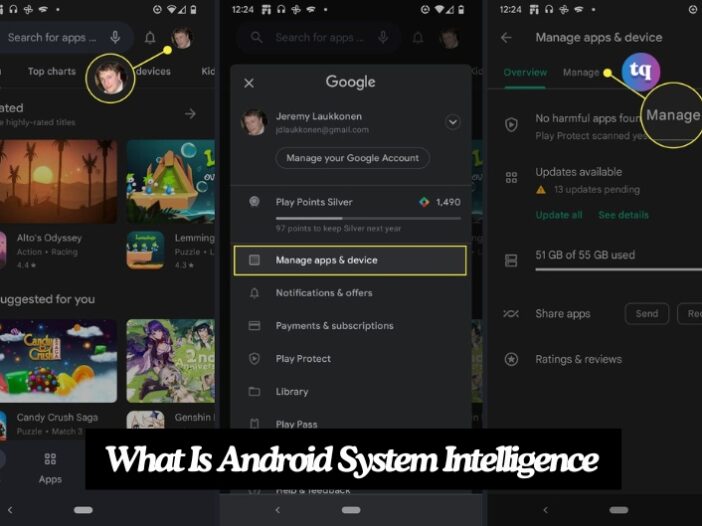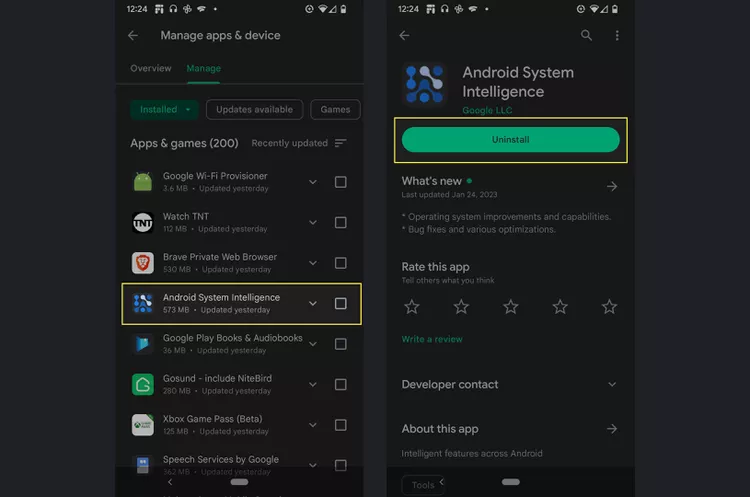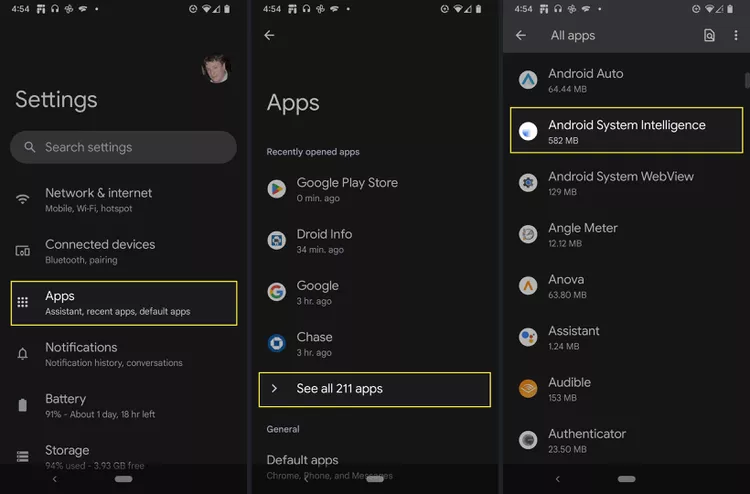
Android phones come with multiple apps pre-installed you may be unfamiliar with. One app you might stumble upon is called “Android System Intelligence” (ASI).
Android System Intelligence (ASI) is behind most smart features on devices, from budget phones to high-end tablets. If you’ve updated it several times in the Google Play Store without knowing what it does, you’ll be surprised how far from the basic functionalities it takes you.
You can disable ASI if you want, but doing so will cause a lot of features to stop working. This article will explain what ASI is and if it’s safe to use.
Table of Contents
What Is Android System Intelligence, and Do I Need It?
Android System Intelligence is built into Android. It supports a variety of smart features and protects your data in the process. Since it requires system permissions and often passes potentially sensitive information from one place to another, this protection is key.
In older versions of Android, it was known as Device Personalization Services, with the new name designed to reflect the fact that it supports smart functions.
While you don’t technically need System Intelligence for your phone to work on a very basic level, like making phone calls, a lot of features won’t function without it. If you ever use any of these features, then you do need Android System Intelligence.
For example, if you shut off System Intelligence, your phone would stop providing automatically generated reply options, the clipboard would stop working correctly, and the search function wouldn’t be able to find apps.
What Features Does Android System Intelligence Support?
ASI supports a wide variety of smart features that leverage machine learning to improve your experience. Here are some of the most important features that are enabled by System Intelligence:
- Attention sensor: Using input from the front-facing camera, Android System Intelligence can keep your screen on as long as it determines that you are looking at the screen. This prevents it from timing out and shutting off when you’re watching a video but lets the screen turn off if you aren’t watching anymore.
- Autorotation: This feature rotates the screen orientation automatically based on the orientation of the phone.
- Automatic captions: This feature is capable of generating live captions for media that doesn’t have captions available.
- Smart text selection: Enables targeted actions when you select the text, like long-pressing an address to view directions. It also turns some text into clickable links.
- Live translation: Capable of translating text in live conversations and videos.
- Voice Typing: Allows you to dictate through Assistant.
- Now Playing: Automatically listens for and identifies music around you, and displays information on the lock screen.
- Notification management: Inserts useful action buttons into notifications, allowing a notification to open a relevant app or provide necessary information when tapped.
- Smart clipboard: Improves the copy and paste system, making it easier to copy information and move it between apps.
Can Android System Intelligence Cause Problems?
ASI is a key component of the Android operating system, so it usually doesn’t cause problems. There have been instances of crashes related to Android System Intelligence, but this is usually only seen in beta builds of the operating system.
You can report crashes or other bugs related to this app to Google. A potential quick fix is to install any Android updates that are available or update the app in the Google Play Store. You can also clear its cache.
Can You Uninstall Android System Intelligence?
You can’t uninstall ASI because it’s a core component of the operating system. However, you can uninstall its app updates the same way you would with any other app.
Following these steps can potentially cause more issues. Only do this if you have a specific reason to.
- Open Google Play, and tap your profile picture at the top.
- Tap Manage apps & device.
- Open the Manage tab.
- Locate and tap Android System Intelligence.
If you can’t find it, open Settings > Apps and search for it there. After opening its App Info page, tap App details at the bottom and then continue with the next step. - Tap Uninstall.

Is Android System Intelligence Safe?
A big part of ASI’s understanding requires access to your usage patterns. You may not like this part considering Android’s open-source nature and Google’s past data breaches.
Rather than send the data to the company or third-party services, the app learns from and processes it locally within the Private Compute Core. The Core acts as a safe room where apps or services communicate and interpret data away from the internet’s prying eyes.
Let’s say you’re composing an email in the Gmail app. ASI scans the context of the email and allows your keyboard to offer predictions. Whether you accept or ignore them, the information stays on the device. Google doesn’t collect it, and it doesn’t go to an external server.
Another example is your screen time. ASI monitors how long you spend on your device and the frequency to make well-being recommendations. It also checks battery life and memory to optimize background processes.
In turn, you save storage and know which apps drain power. More importantly, the component needs your permission to work. It doesn’t function properly if you don’t allow access to contacts, location, messages, and other apps.
Is it Safe to Turn Off Android System Intelligence?
Turning Android System Intelligence off is safe but can cause some inconveniences. As we said, some core features will stop working if ASI is turned off, and the operating system itself may become unstable. Shutting it off doesn’t pose any security risks though.
Here’s how to disable Android System Intelligence:
- Open Settings.
- Tap Apps.
- Tap See all [#] apps.
- Scroll down, and tap Android System Intelligence.

- Tap Disable.
- Tap Disable app to confirm.
Why Does ASI Need Location Permissions?
Google does not specifically disclose why Android System Intelligence needs location permissions. However, Google does mention that the app uses system permissions to provide smart predictions.
The example that Google says relates to the contacts’ permission, but we can also extrapolate the same to the location permission. For example, the app suggestion feature will need access to your location to smartly present ride-sharing apps when you are out and about.
What is The Connection Between ASI and Private Compute Services?
The Android System Intelligence app represents the machine learning features on the phone, and it doesn’t have direct network access. Private Compute Services provides a secure bridge to ASI to connect to the cloud and receive updates to improve the machine learning features.
Conclusion
Android System Intelligence represents the cutting edge of mobile AI technology. As it continues to evolve, it will bring even more powerful and personalized features to users, enhancing the way we interact with our devices.
FAQs
ASI improves your daily phone usage by learning how and when you use your apps and then optimizing your device’s resources accordingly. This means you get a smoother performance and longer battery life because your phone knows to prioritize system resources for the apps you use the most and to put less frequently used apps on standby.
ASI plays a pivotal role in enhancing your device security by continuously monitoring for suspicious activity. Should it detect something unusual, it can immediately protect your data. It’s like a diligent guard, always watching over the safety of your digital life.
For accessibility, ASI offers tools like voice-to-text, audio descriptions, and screen readers that adapt to your usage patterns. These features can improve the device experience for those with different abilities, making technology more inclusive for you and many others.
ASI can effectively reduce your data usage by learning which apps you use most frequently and allocating background data accordingly. It also identifies your WiFi habits to switch to cellular data less often, saving you from potentially exhausting your data plan.
Most definitely, ASI schedules updates for times when you’re not using your device, like while you’re sleeping. This means you can wake up to a phone that’s refreshed with the latest features and security updates, without any inconvenience.
Indeed, it can! ASI can adjust your device settings based on your sleep patterns. For example, if you regularly doze off around 10 PM, it might turn on do not disturb mode or darken your screen closer to that time to help you wind down.
ASI makes integrating with smart home devices straightforward for you. It can automatically detect and connect with compatible devices, allowing you to control your smart home from your phone effortlessly. It’s like being a tech-savvy wizard, commanding your abode with a few taps on your screen.
Webview is another pre-installed part of Android that’s important to how your phone or tablet works. It allows your device to display content from the internet. You shouldn’t uninstall or deactivate it if you plan on using the web.